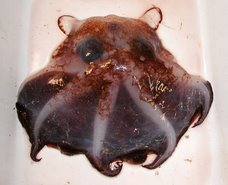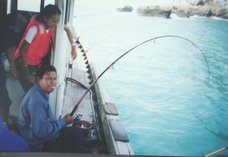"Extinct" Coelacanth Hooked in Indonesia
Though he may have only been angling for dinner, the Indonesian fisher who caught a rare coelacanth has instead snagged a barrage of worldwide media attention.
Yustinus Lahama captured the fish—which scientists not long ago believed had gone extinct with the dinosaurs—Saturday near Bunaken National Marine Park, off Sulawesi island.
The four-foot (1.2-meter), 110-pound (50-kilogram) specimen lived for 17 hours in a quarantine pool, an "extraordinary" feat considering the cold, deep-sea habitat of the fish, marine biologist Lucky Lumingas of the local Sam Ratulangi University told the Associated Press. Lumingas plans to study the carcass.
Yustinus Lahama captured the fish—which scientists not long ago believed had gone extinct with the dinosaurs—Saturday near Bunaken National Marine Park, off Sulawesi island.
The four-foot (1.2-meter), 110-pound (50-kilogram) specimen lived for 17 hours in a quarantine pool, an "extraordinary" feat considering the cold, deep-sea habitat of the fish, marine biologist Lucky Lumingas of the local Sam Ratulangi University told the Associated Press. Lumingas plans to study the carcass.
Scientists were shocked when a coelacanth (pronounced SEE-la-kanth) was found off Africa's coast in 1938. They had believed the fish went extinct 65 million years ago, as did a related lineage of prehistoric fishes.
The fish has been a source of fascination ever since. Several other coelacanths have been caught in recent decades, including another in the species-rich waters of Sulawesi in 1998. Coelacanths usually reach five feet (1.5 meters) in length, have limblike fins, and are covered in hard scales and toothy outgrowths that protect their bodies from rocks and predators. Unlike other fish, they also give birth to live young.
May 22. 2007. National Geographic.com
















No comments:
Post a Comment